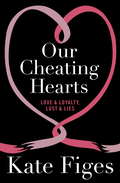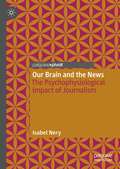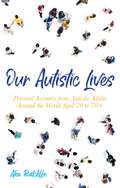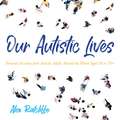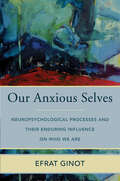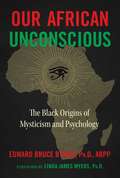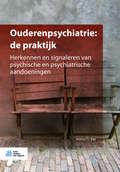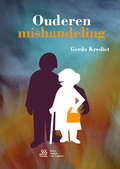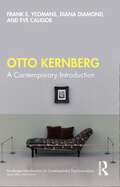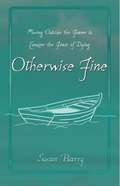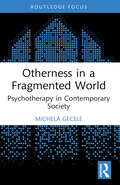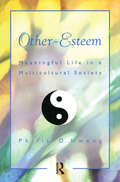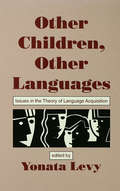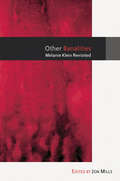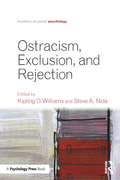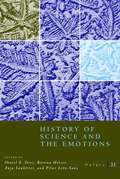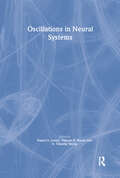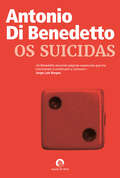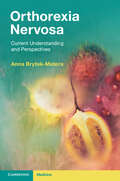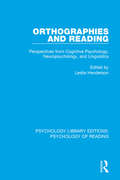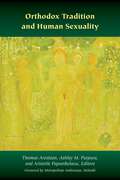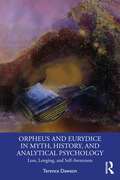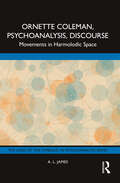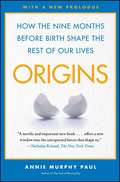- Table View
- List View
Our Cheating Hearts: Love and Loyalty, Lust and Lies
by Kate FigesBy the author known and respected for her acclaimed books on relationships.Most of us manage to be monogamous, most of the time, but who cannot imagine themselves committing the 'crime' of adultery? Does being 'faithful' mean the same to everyone? Why DO people have affairs?Using real life testimony alongside the most current research, Our Cheating Hearts looks at the big questions around love and commitment. It lifts taboos, asks the tough questions and shows how in our progressive time monogamy has become the new ideal.Some people manage monogamy. For the countless others that don't, Our Cheating Hearts opens the debate and provides the honest approach that's essential.
Our Cheating Hearts: Love and Loyalty, Lust and Lies
by Kate FigesBy the author known and respected for her acclaimed books on relationships.Most of us manage to be monogamous, most of the time, but who cannot imagine themselves committing the 'crime' of adultery? Does being 'faithful' mean the same to everyone? Why DO people have affairs?Using real life testimony alongside the most current research, Our Cheating Hearts looks at the big questions around love and commitment. It lifts taboos, asks the tough questions and shows how in our progressive time monogamy has become the new ideal.Some people manage monogamy. For the countless others that don't, Our Cheating Hearts opens the debate and provides the honest approach that's essential.
Our Brain and the News: The Psychophysiological Impact of Journalism
by Isabel NeryThis book explores the impact of news and literary journalism on human cognition and emotion. Providing an innovative analysis of psycho-physiological measures, including emotional response, perception of pain, and changes in heartbeat, Nery seeks to understand how readers react to journalistic texts. There is a growing enthusiasm in the search for understanding the processing of information, with some already arguing for the establishment of the neuroscience of communication as a new discipline. By combing neuroscience methods with communication research studies, specifically journalistic research and theory, Nery offers us a unique way of exploring and thinking about news, literary journalism, and the brain.
Our Autistic Lives: Personal Accounts from Autistic Adults Around the World Aged 20 to 70+
by Edited by Alex RatcliffeThis collection of narratives from autistic adults is structured around their decades of experience of life, covering 20s, 30s, 40s, 50s, 60 and 70s+. These are varied and diverse, spanning different continents, genders, sexualities and ethnicities, yet the author highlights the common themes that unite them and skilfully draws out these threads. Each chapter is based on accounts from one age group and includes accounts from people of that age, giving an insight into the history of autism and signifying how gaining a diagnosis (or not) has changed people's lives over time. The book is about ageing with an autistic mind, and helping the reader find connections between neurotypical and neurodiverse people by acknowledging the challenges we all face in our past, present and futures.
Our Autistic Lives: Personal Accounts from Autistic Adults Around the World Aged 20 to 70+
This collection of narratives from autistic adults is structured around their decades of experience of life, covering 20s, 30s, 40s, 50s, 60 and 70s+. These are varied and diverse, spanning different continents, genders, sexualities and ethnicities, yet the author highlights the common themes that unite them and skilfully draws out these threads. Each chapter is based on accounts from one age group and includes accounts from people of that age, giving an insight into the history of autism and signifying how gaining a diagnosis (or not) has changed people's lives over time. The book is about ageing with an autistic mind, and helping the reader find connections between neurotypical and neurodiverse people by acknowledging the challenges we all face in our past, present and futures.(P) 2020 Hodder & Stoughton Ltd
Our Anxious Selves: Neuropsychological Processes and their Enduring Influence on Who We Are (Norton Series on Interpersonal Neurobiology #0)
by Efrat GinotDiscussing the outsized role that fear, anxiety, and other distressing emotions play in forming fundamental aspects of who we are. Using recent findings from neuropsychology, this new book in the best-selling Norton Series on Interpersonal Neurobiology shows that who we are psychologically starts with the early presence of an easily aroused fear/anxiety system. It goes on to discuss how clinicians can view people’s difficulties with self-confidence and identity, and how self-destructive patterns can be traced back to these systems and what clinicians can do to help. It also touches on intergenerational transmission of trauma, as well as people’s responses to COVID-19, PTSD, and real and imagined threats.
Our African Unconscious: The Black Origins of Mysticism and Psychology
by Edward Bruce Bynum• Examines the Oldawan, the Ancient Soul of Africa, and its correlation with what modern psychologists have defined as the collective unconscious • Draws on archaeology, DNA research, history, and depth psychology to reveal how the biological and spiritual roots of religion and science came out of Africa • Explores the reflections of our African unconscious in the present confrontation in the Americas, in the work of the Founding Fathers, and in modern psychospirituality The fossil record confirms that humanity originated in Africa. Yet somehow we have overlooked that Africa is also at the root of all that makes us human--our spirituality, civilization, arts, sciences, philosophy, and our conscious and unconscious minds. In this extensive look at the unfolding of human history and culture, Edward Bruce Bynum reveals how our collective unconscious is African. Drawing on archaeology, DNA research, depth psychology, and the biological and spiritual roots of religion and science, he demonstrates how all modern human beings, regardless of ethnic or racial categorizations, share a common deeper identity, both psychically and genetically--a primordial African unconscious. Exploring the beginning of early religions and mysticism in Africa, the author looks at the Egyptian Nubian role in the rise of civilization, the emergence of Kemetic Egypt, and the Oldawan, the Ancient Soul, and its correlation with what modern psychologists have defined as the collective unconscious. Revealing the spiritual and psychological ramifications of our shared African ancestry, the author examines its reflections in the present confrontation in the Americas, in the work of the Founding Fathers, and in modern Black spirituality, which arose from African diaspora religion and philosophy. By recognizing our shared African unconscious--the matrix that forms the deepest luminous core of human identity--we learn that the differences between one person and another are merely superficial and ultimately there is no real separation between the material and the spiritual.
Ouderenpsychiatrie: Herkennen en signaleren van psychische en psychiatrische aandoeningen
by Martin G. KatDit boek leert zorgprofessionals die werken met ouderen, om psychiatrische en psychische aandoeningen bij hun cliënten te herkennen en signaleren. Zij kunnen dankzij dit boek vroege adequate behandeling mogelijk maken.Dit boek koppelt praktijkvoorbeelden aan de beschreven aandoeningen bij ouderen. Professionals die werken met ouderen, zoals verzorgenden, (wijk)verpleegkundigen, POH’s en casemanagers.
Ouderenmishandeling
by Gerda KredietHet boek ‘Ouderenmishandeling’ is bedoeld voor professionals in de zorg die in hun werk te maken krijgen met ouderen die mishandeld worden. Ouderenmishandeling is vaak een gevolg van overbelaste mantelzorg, echtelijke ruzies en opzettelijke mishandeling. De mishandeling kan bestaan uit lichamelijke mishandeling, psychische mishandeling, verwaarlozing, financiële uitbuiting en seksuele mishandeling. Het boek bestaat uit twee delen. In het eerste deel zijn vijftien casussen beschreven, waarna een analyse volgt van de gepleegde interventies en de resultaten. De casuïstiek is toegankelijk beschreven en maakt goed duidelijk wat ouderenmishandeling precies is, ook voor de nonprofessional. In het tweede deel worden interventiemogelijkheden beschreven die professionele hulpverleners concreet kunnen helpen bij de aanpak van ouderenmishandeling. Daarnaast vindt de lezer belangrijke informatie over wet- en regelgeving. ‘Ouderenmishandeling’ is een onmisbaar boek voor iedereen die zich beroepsmatig bezighoudt met ouderen: aandachtfunctionarissen, medewerkers Steunpunten Huiselijk Geweld, artsen, psychiaters, verpleegkundigen, thuiszorgmedewerkers, ouderenadviseurs en maatschappelijk werkers. Gerda Krediet werkte tien jaar als sociaalpsychiatrisch verpleegkundige bij het Meldpunt Ouderenmishandeling van de GGD Rotterdam-Rijnmond. Zij is nu directeur van Nood Zaak, een bureau voor advies, onderzoek en interventie bij ouderenmishandeling, en professioneel mentorschap.
Otto Kernberg: A contemporary Introduction (Routledge Introductions to Contemporary Psychoanalysis)
by Diana Diamond Eve Caligor Frank E. YeomansIn this book, Frank E. Yeomans, Diana Diamond, and Eve Caligor provide a systemic review of Otto Kernberg’s multiple contributions to psychoanalysis, psychiatry, psychology, and our understanding of the mind and group behavior.The book spans the full scope of Kernberg’s career, both highlighting the diversity of topics on which his writings have shed light and emphasizing conceptual threads that link the different areas of his work. It accessibly follows the experiences that had an impact on the development of his thought and the increasingly strong impact his writing and thinking have had on psychoanalysis and related fields. The authors draw on their decades of working closely with Kernberg to offer a unique insight into his teaching and research, focusing on his work on borderline and narcissistic pathology and the fundamental conceptualization of personality disorders.Including an overview of Kernberg’s critique and expansion of traditional psychoanalytic training, as well as his role in developing transference-focused psychotherapy, this book is an invaluable guide to students, researchers, and analysts in practice and training looking to integrate Kernberg’s ideas into their own clinical and theoretical work.
Otherwise Fine: Moving Outside the Frame to Conquer the Fears of Dying
by Susan BarryThe "worm at the core" is what William James called the fear of dying in each of us. Otherwise Fine treats the myriad forms of this fear, particularly those heightened in our prime middle years of good health. These can be more acute in Late-or-Never-Bloomers, those who suffer the "Blew-It Anxiety" of unmet potentials or the misfortune of circumstances, inauthentic or diffused identities; as well as those with skeptical or quasi-afterlife beliefs. Also offered are four guideposts for weathering the dying stage itself, and a look beyond it.
Otherness in a Fragmented World: Psychotherapy in Contemporary Society (Field Perspectives and Clinical Practice)
by Michela GeceleThis book explores a key theme both for humanity and for psychotherapy—how we can understand ourselves as a web of relational connections within the wider world that shapes us all.Grounds are the often invisible scenery of our life. They are all that concern us as human beings—the sum total of relationships, events, all that happens and has happened, our conquests, and our connections together with what is unfinished and what has yet to emerge. Moving within a horizon of phenomenology and Gestalt therapy, the author explores how we are continuously built and kept alive through our unceasing engagement with otherness—whether cultural, social, linguistic, gender or otherwise, and so how humanity is intrinsically made by otherness, novelty, and challenging experiences that transform us in a way we can never anticipate. At the same time, we also define ourselves by identifying with certain groups which become part of who we see ourselves as being. Her aim is to describe and connect the forms of suffering and the creative adjustments found today with the grounds from which they emerge, rather than with the figures that stand out more visibly and can blind us.Drawing on extensive clinical practice and a deep understanding of Gestalt Therapy, this is essential reading for all psychotherapists and anyone seeking to understanding how we exist as human beings and as part of a plurality of affiliations and non-affiliations.
Other Esteem: Meaningful Life in a Multicultural Society (Accelerated Development Ser.)
by Philip O. HwangFirst published in 2000. Routledge is an imprint of Taylor & Francis, an informa company.
Other Children, Other Languages: Issues in the theory of Language Acquisition
by Yonata LevyThis volume investigates the implications of the study of populations other than educated, middle-class, normal children and languages other than English on a universal theory of language acquisition. Because the authors represent different theoretical orientations, their contributions permit the reader to appreciate the full spectrum of language acquisition research. Emphasis is placed on the principle ways in which data from pathology and from a variety of languages may affect universal statements. The contributors confront some of the major theoretical issues in acquisition.
Other Banalities: Melanie Klein Revisited
by Jon MillsMelanie Klein is one of the few analysts whose body of work has inspired sociologists, philosophers, religious scholars, literary critics and political theorists, all attracted to the cross-fertilisation of her ideas. Other Banalities represents a long over-due exploration of her legacy, including contributions from acclaimed interdisciplinary scholars and practitioners. The contributors situate Klein within the history of the psychoanalytic movement, investigate her key theoretical and clinical advances, and look at how her thought has informed contemporary perspectives in the behavioural sciences and humanities. Topics covered range from Klein’s major psychological theories to clinical pathology, child development, philosophy, sociology, politics, religion, ethics and aesthetics. This volume reflects the auspicious future for Kleinian revivalism and demonstrates the broad relevance of Kleinian thought. It will be of great interest to scholars and practitioners of psychology, psychoanalysis and psychotherapy.
Ostracism, Exclusion, and Rejection: Ostracism, Social Exclusion, Rejection, And Bullying (Frontiers of Social Psychology #Vol. 7)
by Kipling D. Williams Steve A. NidaOstracism, Exclusion, and Rejection examines research into the related phenomena of ostracism, exclusion and rejection. Most individuals have experienced both sides of the coin: being ostracized and ostracizing others. People experience mild forms of ostracism on a daily basis, but some endure years and decades of being the social outcast. How does it feel to be shunned, left out, not wanted? Research suggests that even the mildest and briefest forms of ostracism are painful and have downstream consequences to our feelings of social connection. Longer-term ostracism has devastating consequences on individuals’ health and well-being. This innovative compilation covers how being cast out affects the brain and body chemistry, feelings and emotions, thoughts and beliefs, and behaviors. In addition to the primary focus on targets of ostracism, researchers also examine the motives and consequences of ostracizing. Social scientists from social psychology, developmental psychology, neuroscience, communication science, cross-cultural psychology, and anthropology tackle these questions with cutting-edge methods and provocative theories. A key volume for all in those fields, this book also presents applications from the schoolyard to the workplace, and sounds a much-needed call for further research on this universal behavior of all social animals.
Osiris, Volume 31: History of Science and the Emotions (Osiris #31)
by The University of Chicago PressWhat new insights become available for historians when emotions are included as an analytical category? This volume of Osiris explores the historical interrelationships between science and its cultures and cultures of emotions. It argues that a dialogue between the history of emotions and the history of science leads to a rethinking of our categories of analysis, our subjects, and our periodizations. The ten case studies in the volume explore these possibilities and interrelationships across North America and Europe, between the twelfth and the twentieth centuries, in a variety of scientific disciplines. They analyze how scientific communities approached and explained the functions of emotions; how the concomitant positioning of emotions in or between body-mind-intersubjectivity took place; how emotions infused practices and how practices generated emotions; and, ultimately, how new and emerging identities of and criteria for emotions created new knowledge, new technologies, and new subjectivities.
Oscillations in Neural Systems (INNS Series of Texts, Monographs, and Proceedings Series)
by Daniel S. Levine Vincent R. Brown Timothy ShireyThis book is the fourth in a series based on conferences sponsored by the Metroplex Institute for Neural Dynamics (MIND), an interdisciplinary organization of Dallas-Fort Worth area neural network professionals in both academia and industry. This topic was chosen as the focus for this special issue because of the increasing interest by neuroscientists and psychologists in both rhythmic and chaotic activity patterns observed in the nervous system. Neither the mathematical structure of neural oscillations nor their functional significance is precisely understood. There are a great many open problems in both the structure and function of neural oscillations, whether rhythmic, chaotic, or a combination of the two, and many of these problems are dealt with in the chapters of this book.
Os Suicidas
by Antonio di BenedettoRomance que encerra a «Trilogia da Espera» — iniciada com Zama e continuada com O Silencieiro —, Os Suicidas, de Antonio Di Benedetto, prolonga, com a sua arte da precisão e da ironia, esse solilóquio narrativo que se propõe representar o mundo e a impossibilidade de nele viver, e que constitui um dos apogeus da Literatura do século XX. Um jornalista, figura egocêntrica, melancólica e pouco apreciada pelos demais, assíduo frequentador de cinemas e de encontros de boxe, é incumbido de escrever uma série de crónicas sobre os suicídios que têm ocorrido na cidade. Com Marcela, a fotógrafa, embrenha-se no seu trabalho de investigação, que tem tanto de policial como de ensaio antológico sobre esse acto misterioso e derradeiro, e acaba por se isolar quase masoquistamente na sua obsessão, com consequências para a sua vida familiar e amorosa: há mais de uma dezena de suicidas na família, incluindo o seu pai, que se matou aos trinta e três anos, idade que o protagonista está em vias de completar. À medida que a data fatídica se aproxima, uma questão torna-se premente: será o suicídio hereditário? «Leitor ardente de Dostoiévski, Di Benedetto sentiu-se naturalmente compelido a escrever sobre estados extremos — obsessão, delírio, agressão selvagem.» The New Yorker
Orthorexia Nervosa: Current Understanding and Perspectives
by Anna Brytek-MateraWhilst many people try to make healthy food choices to improve their health, for others the focus on healthy eating can become obsessive and lead to maladaptive eating behaviours and poorer health. Orthorexia nervosa is a preoccupation with the quality of healthy food, where a refusal of certain foods is driven by the desire to be healthy. Orthorexia Nervosa: Current Understanding and Perspectives is the first clinical book that systematically explores this condition. The book contains in-depth information, with chapters highlighting diagnostic criteria, assessment, prevalence, multidimensional characteristics, future directions and treatment. Additional expert commentary delivers valuable insights to further provide readers with a better understanding of this condition. This informative and engaging book is a valuable resource for academics, researchers, health professionals and students interested in eating behaviour. It is an essential read for anyone wanting a better understanding of orthorexia nervosa and its impact on individuals' health.
Orthographies and Reading: Perspectives from Cognitive Psychology, Neuropsychology, and Linguistics (Psychology Library Editions: Psychology of Reading #3)
by Leslie HendersonOriginally published in 1984, the previous two decades had seen a rebirth of psychological interest in the process of reading. Attention had increasingly been directed to aspects of fluent reading, such as eye-movement control or contextual effects within the sentence, to a great extent progress had depended on refinement of the experimental analysis of factors that govern the processing of isolated words. This seemingly narrow concern with word recognition turned out to raise a rich collection of questions about the reader’s access to phonology and meaning. In this volume these questions are pursued across the range of orthographic systems which written languages exhibit.
Orthodox Tradition and Human Sexuality (Orthodox Christianity and Contemporary Thought)
by Thomas Arentzen, Ashley M. Purpura, and Aristotle PapanikolaouSex is a difficult issue for contemporary Christians, but the past decade has witnessed a newfound openness regarding the topic among Eastern Orthodox Christians. Both the theological trajectory and the historical circumstances of the Orthodox Church differ radically from those of other Christian denominations that have already developed robust and creative reflections on sexuality and sexual diversity. Within its unique history, theology, and tradition, Orthodox Christianity holds rich resources for engaging challenging questions of sexuality in new and responsive ways. What is at stake in questions of sexuality in the Orthodox tradition? What sources and theological convictions can uniquely shape Orthodox understandings of sexuality? This volume aims to create an agora for discussing sex, and not least the sexualities that are often thought of as untraditional in Orthodox contexts.Through fifteen distinct chapters, written by leading scholars and theologians, this book offers a developed treatment of sexuality in the Orthodox Christian world by approaching the subject from scriptural, patristic, theological, historical, and sociological perspectives. Chapters devoted to practical and pastoral insights, as well as reflections on specific cultural contexts, engage the human realities of sexual diversity and Christian life. From re-thinking scripture to developing theologies of sex, from eschatological views of eros to re-evaluations of the Orthodox responses to science, this book offers new thinking on pressing, present-day issues and initiates conversations about homosexuality and sexual diversity within Orthodox Christianity.
Orpheus and Eurydice in Myth, History, and Analytical Psychology: Loss, Longing, and Self-Awareness
by Terence DawsonThis fascinating study shows how the minor Greek story of Orpheus and Eurydice came to have a more persistent and varied impact on Western culture than any other Greek myth. In the last 2,000 years, it has captivated the imagination of successive ages. Writers and other artists have turned to it to explore unexpectedly diverse concerns, from classical philosophy, through Christian values, to challenges involving individual psychology and societal well-being.Dawson’s study of the mythic imagination traces how these concerns unfold in poems, plays, novels, films, paintings, operas, ballets, and sculptures. It charts a history of responses to the experience of loss and longing and the need to grow in self-awareness. And it illustrates how responses to this myth anticipate many of the claims associated with analytical psychology.This book will be of interest to analysts, scholars, and students working with Jung’s ideas, and to all those interested in adaptations of myth and the implications they harbour.
Ornette Coleman, Psychoanalysis, Discourse: Movements in Harmolodic Space (The Lines of the Symbolic in Psychoanalysis Series)
by A. L. JamesOrnette Coleman, Psychoanalysis, Discourse develops tools from psychoanalysis for the analysis of Ornette Coleman's discourse.In this psychoanalytic, philosophical and musical meditation on what it means to follow, A. L. James presents an approach to the analysis of discourse that is a kind of listening for listening – an attempt to discern in and between the lines of Coleman's speech the implication of new ways to listen, new ways to experience Coleman’s music as movement and space – as Movements in Harmolodic Space. Each chapter of this book is oriented with respect to fragments from Coleman’s discourse, dealing with a piece, or collection of pieces, from Coleman’s work, with particular attention to the implication of relations and relationality. Insofar as Coleman’s discourse about his work also contains allusions to fields beyond music, it develops tools that draw elements and structures from these fields together, finding in their relation echoes and parallels.Ornette Coleman, Psychoanalysis, Discourse will be of great interest to psychoanalysts, musicians, and musicologists. It will be relevant for academics and scholars of psychoanalytic and Lacanian studies, music, and cultural studies.
Origins: How the Nine Months Before Birth Shape the Rest of Our Lives
by Annie Murphy PaulWhat makes us the way we are? Some say it's the genes we inherit at conception. Others are sure it's the environment we experience in childhood. But could it be that many of our individual characteristics--our health, our intelligence, our temperaments--are influenced by the conditions we encountered before birth? That's the claim of an exciting and provocative field known as fetal origins. Over the past twenty years, scientists have been developing a radically new understanding of our very earliest experiences and how they exert lasting effects on us from infancy well into adulthood. Their research offers a bold new view of pregnancy as a crucial staging ground for our health, ability, and well-being throughout life. Author and journalist Annie Murphy Paul ventures into the laboratories of fetal researchers, interviews experts from around the world, and delves into the rich history of ideas about how we're shaped before birth. She discovers dramatic stories: how individuals gestated during the Nazi siege of Holland in World War II are still feeling its consequences decades later; how pregnant women who experienced the 9/11 attacks passed their trauma on to their offspring in the womb; how a lab accident led to the discovery of a common household chemical that can harm the developing fetus; how the study of a century-old flu pandemic reveals the high personal and societal costs of poor prenatal experience. Origins also brings to light astonishing scientific findings: how a single exposure to an environmental toxin may produce damage that is passed on to multiple generations; how conditions as varied as diabetes, heart disease, and mental illness may get their start in utero; why the womb is medicine's latest target for the promotion of lifelong health, from preventing cancer to reducing obesity. The fetus is not an inert being, but an active and dynamic creature, responding and adapting as it readies itself for life in the particular world it will enter. The pregnant woman is not merely a source of potential harm to her fetus, as she is so often reminded, but a source of influence on her future child that is far more powerful and positive than we ever knew. And pregnancy is not a nine-month wait for the big event of birth, but a momentous period unto itself, a cradle of individual strength and wellness and a crucible of public health and social equality.With the intimacy of a personal memoir and the sweep of a scientific revolution, Origins presents a stunning new vision of our beginnings that will change the way you think about yourself, your children, and human nature itself.
